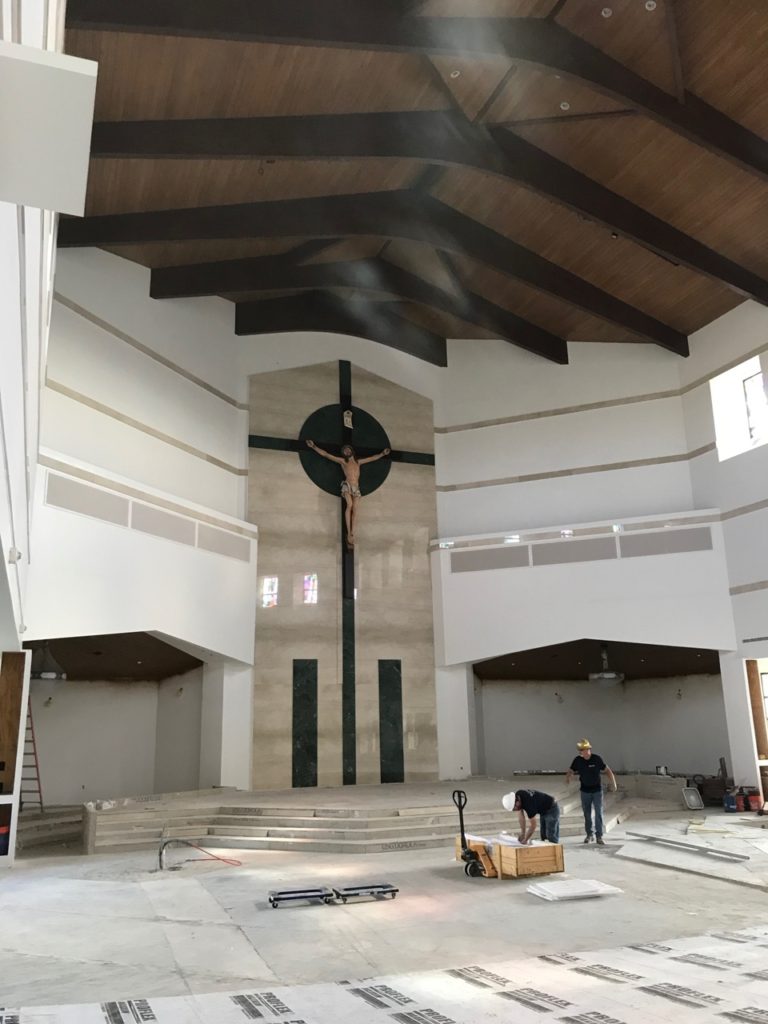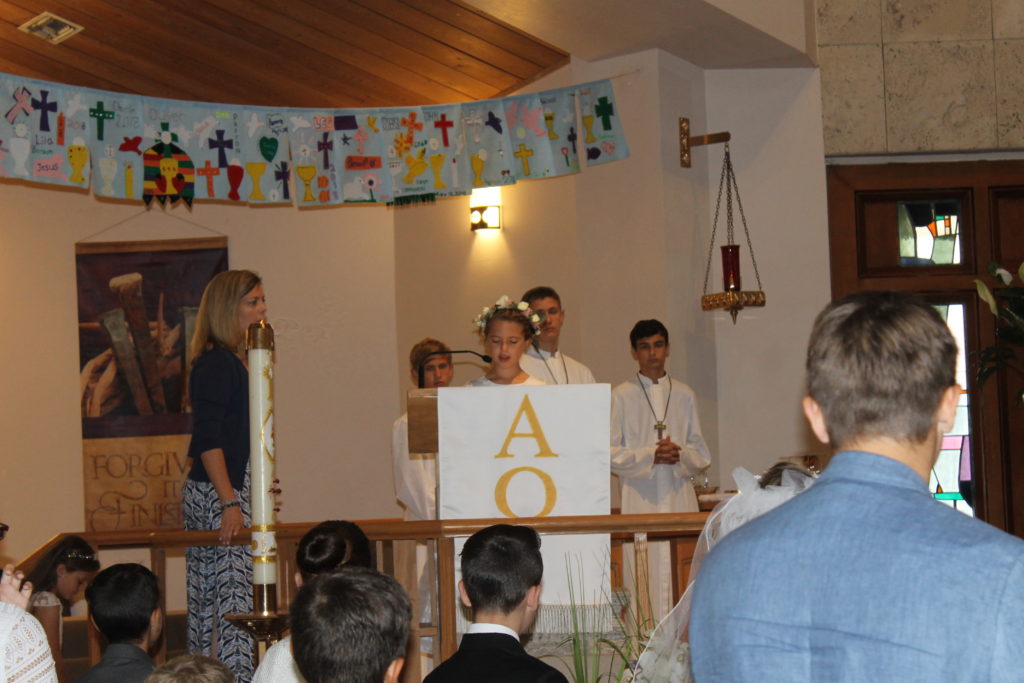
Exhortation on Young People and the Entire People of God
In the past, we have discussed the connection between Pope Francis’ vision for the future of the Catholic Church and our own foci on developing programs that enrich all ages, body, mind, soul, and spirit. However, with the release of his most recent Exhortation, “Christus Vivit”, we have been given the direction from Our Holy Father that mirrors our programs and efforts exactly. From the Renewal of our Parish Mission through to the engagement of the various age groups with each other, to the specific emphasis on programs that integrate our faith into our daily lives, the message from the Pope is clear: the Parish Family of Saint John is focused on the future of the Church.
While the document is about 67 pages long (with Index), it is a wonderful and engaging read that I hope every member of our Parish Family takes the time to digest for themselves. We have copies in our new Library for people to borrow if they would like. Here are some of the critical highlights that illustrate our vision is in line with Pope Francis:

Church Open to Renewal
Let us ask the Lord to free the Church from those who would make her grow old, encase her in the past, hold her back or keep her at a standstill. But let us also ask him to free her from another temptation: that of thinking she is young because she accepts everything the world offers her, thinking that she is renewed because she sets her message aside and acts like everybody else. No!
… [W]e must dare to be different, to point to ideals other than those of this world, testifying to the beauty of generosity, service, purity, perseverance, forgiveness, fidelity to our personal vocation, prayer, the pursuit of justice and the common good, love for the poor, and social friendship.
Christ’s Church can always yield to the temptation to lose enthusiasm because she no longer hears the Lord calling her to take the risk of faith, to give her all without counting the dangers; she can be tempted to revert to seeking a false, worldly form of security…
Those of us who are no longer young need to find ways of keeping close to the voices and concerns of young people. “Drawing together creates the conditions for the Church to become a place of dialogue and a witness to life-giving fraternity”.
Christus Vivit 35-38

A Church Attentive to the Signs of the Times
Consequently, the Church should not be excessively caught up in herself but instead, and above all, reflect Jesus Christ. This means humbly acknowledging that some things concretely need to change, and if that is to happen, she needs to appreciate the vision but also the criticisms of young people.
…They do not want to see a Church that is silent and afraid to speak, but neither one that is always battling obsessively over two or three issues…
Our best dreams are only attained through hope, patience and commitment, and not in haste. At the same time, we should not be hesitant, afraid to take chances or make mistakes. Avoid the paralysis of the living dead, who have no life because they are afraid to take risks, to make mistakes or to persevere in their commitments. Even if you make mistakes, you can always get up and start over, for no one has the right to rob you of hope.
Christus Vivit 39-41, 142

Taking Risks Together
Helping the young to discover the living richness of the past, to treasure its memory and to make use of it for their choices and opportunities, is a genuine act of love towards them, for the sake of their growth and the decisions they are called to make”…
This does not mean having to agree with everything adults say or approving all their actions. A young person should always have a critical spirit…
The world has never benefited, nor will it ever benefit, from a rupture between generations…
…We grandfathers and grandmothers need to form a choir. I envision elders as a permanent choir of a great spiritual sanctuary, where prayers of supplication and songs of praise support the larger community that works and struggles in the field of life”.[105] It is a beautiful thing when “young men and maidens together, old men and children, praise the name of the Lord” (Ps 148:12-13).
If we journey together, young and old, we can be firmly rooted in the present, and from here, revisit the past and look to the future. To revisit the past in order to learn from history and heal old wounds that at times still trouble us. To look to the future in order to nourish our enthusiasm, cause dreams to emerge, awaken prophecies and enable hope to blossom. Together, we can learn from one another, warm hearts, inspire minds with the light of the Gospel, and lend new strength to our hands.
Young people need to have their freedom respected, yet they also need to be accompanied. The family should be the first place of accompaniment. Youth ministry can present the ideal of life in Christ as the process of building a house on rock (cf. Mt7:24-25). For most young people, that house, their life, will be built on marriage and married love. That is why youth ministry and the pastoral care of families should be coordinated and integrated, with the aim of ensuring a continuous and suitable accompaniment of the vocational process.
The community has an important role in the accompaniment of young people; it should feel collectively responsible for accepting, motivating, encouraging and challenging them.
The same young people described to us the qualities they hope to find in a mentor, and they expressed this with much clarity. “The qualities of such a mentor include: being a faithful Christian who engages with the Church and the world; someone who constantly seeks holiness; someone who is a confidant without judging. Similarly, someone who actively listens to the needs of young people and responds in kind; someone deeply loving and self-aware; someone who recognizes his or her limits and knows the joys and sorrows of the spiritual journey. An especially important quality in mentors is the acknowledgement of their own humanity – the fact that they are human beings who make mistakes: not perfect people but forgiven sinners…
Christus Vivit 187-199, 242-246

Youth Ministry is the Ministry of the Entire Church
… Although it is never easy to approach young people, two things have become increasingly evident: the realization that the entire community has to be involved in evangelizing them, and the urgent requirement that young people take on a greater role in pastoral outreach.
… Youth ministry needs to become more flexible: inviting young people to events or occasions that provide an opportunity not only for learning, but also for conversing, celebrating, singing, listening to real stories and experiencing a shared encounter with the living God.
… Motivated by this spirit, we can move towards a participatory and co-responsible Church, one capable of appreciating its own rich variety, gratefully accepting the contributions of the lay faithful, including young people and women, consecrated persons, as well as groups, associations and movements. No one should be excluded or exclude themselves”.
In this outreach, we need to use above all the language of closeness, the language of generous, relational and existential love that touches the heart, impacts life, and awakens hope and desires. Young people need to be approached with the grammar of love, not by being preached at…
… In some places, it happens that young people are helped to have a powerful experience of God, an encounter with Jesus that touched their hearts. But the only follow-up to this is a series of “formation” meetings featuring talks about doctrinal and moral issues, the evils of today’s world, the Church, her social doctrine, chastity, marriage, birth control and so on. As a result, many young people get bored, they lose the fire of their encounter with Christ and the joy of following him; many give up and others become downcast or negative. Rather than being too concerned with communicating a great deal of doctrine, let us first try to awaken and consolidate the great experiences that sustain the Christian life. In the words of Romano Guardini, “when we experience a great love… everything else becomes part of it”.
We need to make all our institutions better equipped to be more welcoming to young people, since so many have a real sense of being orphaned…
Along these lines, our institutions should provide young people with places they can make their own, where they can come and go freely, feel welcome and readily meet other young people, whether at times of difficulty and frustration, or of joy and celebration. Some of this is already happening in oratories and other youth centres, which in many cases offer a friendly and relaxed setting where friendships can grow, where young men and women can meet one another, where they can share music, games, sports, but also reflection and prayer. In such places, much can be offered, without great expenditure of funds. Then too, the person-to-person contact indispensable for passing on the message can happen, something whose place cannot be taken by any pastoral resource or strategy.
Christian service represents a unique opportunity for growth and openness to God’s gifts of faith and charity. Many young people are attracted by the possibility of helping others, especially children and the poor. Often this service is the first step to a discovery or rediscovery of life in Christ and the Church. Many young people grow weary of our programmes of doctrinal and spiritual formation, and at times demand a chance to be active participants in activities that benefit others.

Nor can we overlook the importance of the arts, like theatre, painting, and others. “Music is particularly important, representing as it does a real environment in which the young are constantly immersed, as well as a culture and a language capable of arousing emotion and shaping identity…

“Equally significant is the emphasis that young people place on sports; the Church should not underestimate the potential of sports for education and formation, but instead maintain a strong presence there…
… At times, in the attempt to develop a pure and perfect youth ministry, marked by abstract ideas, protected from the world and free of every flaw, we can turn the Gospel into a dull, meaningless and unattractive proposition. Such a youth ministry ends up completely removed from the world of young people and suited only to an elite Christian youth that sees itself as different, while living in an empty and unproductive isolation. In rejecting the weeds, we also uproot or choke any number of shoots trying to spring up in spite of their limitations.
Instead of “overwhelming young people with a body of rules that make Christianity seem reductive and moralistic, we are called to invest in their fearlessness and to train them to take up their responsibilities, in the sure knowledge that error, failure and crisis are experiences that can strengthen their humanity”.
Christus Vivit 202-233

A Final Wish
Dear young people, my joyful hope is to see you keep running the race before you, outstripping all those who are slow or fearful. Keep running, “attracted by the face of Christ, whom we love so much, whom we adore in the Holy Eucharist and acknowledge in the flesh of our suffering brothers and sisters. May the Holy Spirit urge you on as you run this race. The Church needs your momentum, your intuitions, your faith. We need them! And when you arrive where we have not yet reached, have the patience to wait for us”.[164]
Christus Vivit 299



